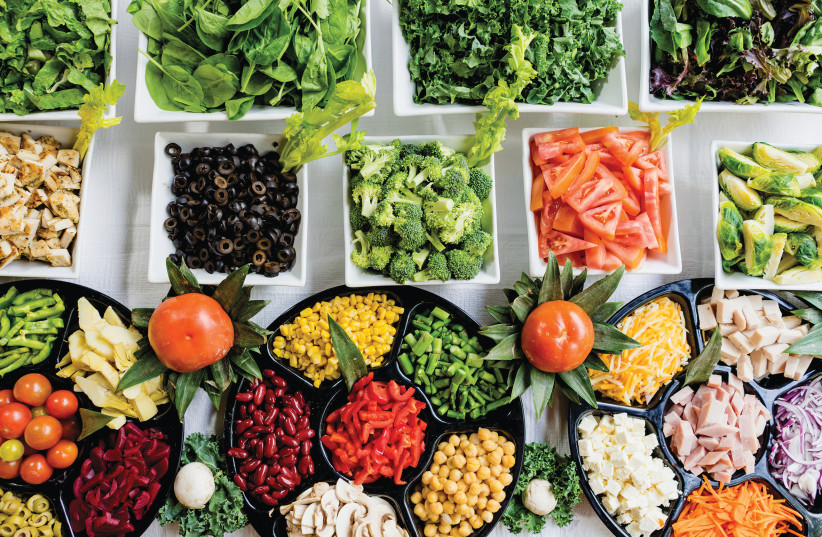It’s common knowledge today that fiber, which comes from vegetables or whole-grain products, is a healthful and important part of our daily meals. But what is fiber, and why is it good for you?
Fiber—cellulose, the stringy stuff that leaves, stems, roots, stalks, and tree trunks are made of—helps keep our intestinal flora (bacteria known to scientists as the gut microbiome) happy and balanced.
Fiber is the starting point of a natural food chain, beginning with bacteria that can digest cellulose, thus providing the rest of our microbiome with a balanced diet. However, the eating habits in industrialized societies are far removed from those of ancient humans and impact our intestinal flora; newly discovered cellulose-degrading bacteria are being lost from the human gut microbiome, especially in developed countries.
Mammals, including humans, rely on their gut’s microbial community to break down plant cell wall components, notably cellulose and associated polysaccharides. But there is limited evidence for cellulose fermentation in the human gut, despite the benefits of cellulose-containing dietary fiber for gut-microbiome health and overall human wellbeing.
Urban societies are losing healthful gut microbes
According to a study just published in the prestigious journal Science entitled, “Cryptic diversity of cellulose-degrading gut bacteria in industrialized humans,” people living in urban societies are losing healthful gut microbes that turn fiber into food for a healthy digestive tract.

Prof. Itzhak Mizrahi at Ben-Gurion University (BGU) of the Negev in Beersheba, with support from the Weizmann Institute of Science in Rehovot and international collaborators in the US and Europe, conducted the research. “Throughout human evolution, fiber has always been a mainstay of the human diet,” explains lead investigator Sarah Moraïs from BGU. “It is also a main component in the diet of our primate ancestors. Fiber keeps our intestinal flora healthy.”
Moraïs and her colleagues identified important new members of the human gut microbiome – cellulose-degrading bacteria named Ruminococcus. These bacteria degrade cellulose by producing large, highly specialized extracellular protein complexes called cellulosomes.
“It’s no easy task to degrade cellulose, as few bacteria can do it.” explained Weizmann Prof. Edward Bayer, a world leader on cellulosomes and coauthor of the study. “Cellulose is difficult to digest because it is insoluble. Fiber in the gut is like a tree trunk in a swimming pool; it gets wet, but it doesn’t dissolve.”
Cellulosomes are engineered by bacteria to attach to cellulose fibers and peel them apart, like the individual threads in a piece of rope. The cellulosomal enzymes then break down the individual threads of fiber into shorter chains, making them soluble. They can be digested not only by Ruminococcus but also by many other members of the gut microbiome.
“The bottom line is that cellulosomes turn fiber into sugars that feed an entire community. This is a formidable engineering feat,” Bayer noted. “The production of cellulosomes puts Ruminococcus at the top of the fiber-degradation cascade that feeds a healthy gut microbiome. But the evolutionary history of Ruminococcus is complicated, and Western culture is taking its toll on our microbiome, as the new study shows.”
“These cellulosome-producing bacteria have been around for a long time, and their ancestors are important members of the rumen microbiome in cows and sheep,” added Mizrahi, a senior author of the study. “The rumen is the special stomach organ of cows, sheep, and deer, where the grass, which is fiber, that they eat is converted into useful food by cellulose-degrading microbes, including Ruminococcus. We were surprised to see that the cellulosome-producing bacteria of humans seem to have switched hosts during evolution because the strains from humans are more closely related to the strains from livestock than to the strains from our own primate ancestors.”
It seems that humans have acquired important components of a healthy gut microbiome from livestock that they domesticated early in human evolution. “It’s a real possibility,” said Mizrahi, an expert on rumen biology.
“However, the story does not end there. Sampling of human cohorts revealed that Ruminococcus strains are indeed robust components of the human gut microbiome among human hunter-gatherer societies and rural human societies but that they are sparse or missing in human samples from industrialized societies.
rural human societies, but they are sparse or missing in human samples from industrialized societies.
“Our ancestors in Africa 200,000 years ago didn’t pick up lunch from a drive-through or phone in a home-delivery for dinner,” added Prof. William Martin, an evolutionary biologist and coauthor of the study who works at the Heinrich Heine University in Düsseldorf in Germany.
“In Western societies, however, this does happen on a large scale. Diet is changing in industrialized societies, far removed from the farms producing food.”
The authors concluded that this shift away from a fiber-rich diet explains the loss of critical cellulose-degrading microbes in our microbiome. How can we counteract this evolutionary decline? It might help to do what doctors and dieticians have been saying for decades: Eat more fiber!”
